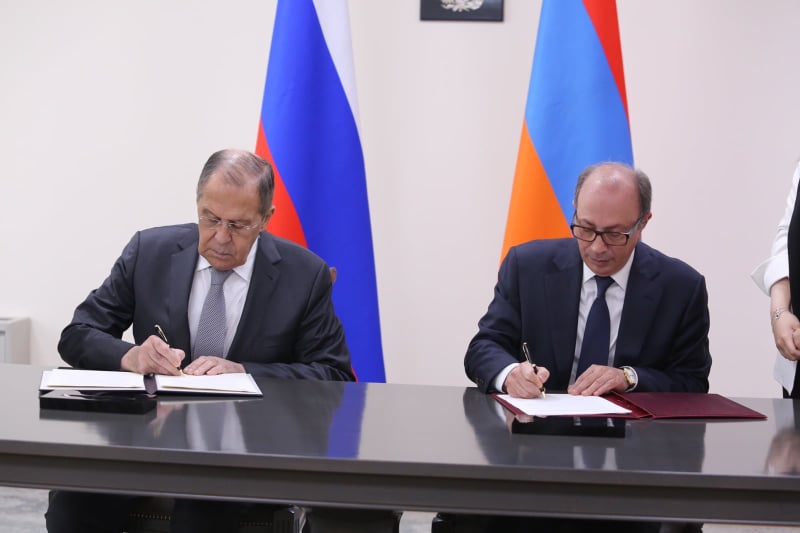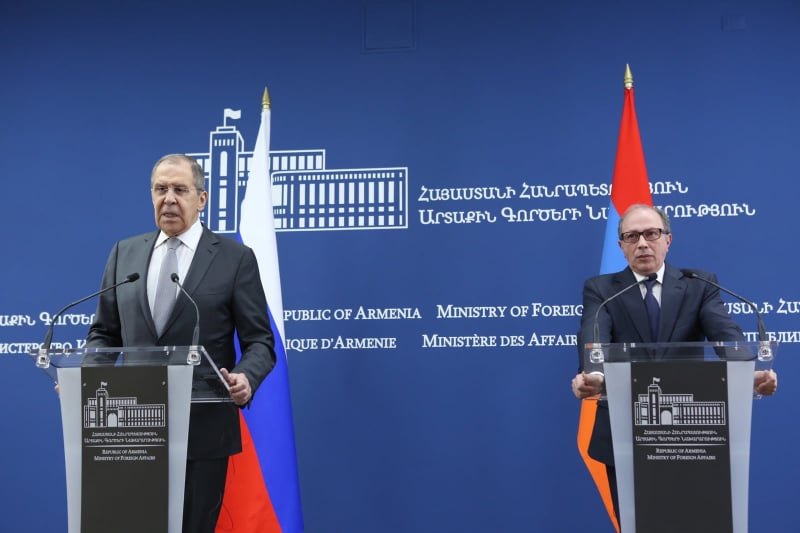Russian FM Lavrov's visit to Armenia leaves many questions unanswered
The main outcome of the Russian Foreign Minister’s visit to Armenia was the signing of a memorandum on biological safety which Sergey Lavrov first spoke about back in November 2019, during his last visit to Yerevan. Then, one of the important topics of the visit of the head of the Russian Foreign Ministry was the bio laboratory created by the Pentagon in Armenia.
On May 6, during a press conference which was held shortly after the latest talks with his Armenian counterpart, Sergey Lavrov again highlighted the important contribution of the signed document to cooperation in the field of biological security.
It is also reported that during the talks with Sergey Lavrov Armenia raised the issue of returning the Armenian prisoners of war who remain in Azerbaijan after the second Karabakh war. The parties also discussed the issue of boosting the negotiation process on Karabakh and the role of Russian peacekeepers.
Armenian society was expecting more concrete answers and decisions to be made on these issues.
Below, we address what biological laboratories were being talked about, why they are important for Moscow, as well as what Armenia thinks about the process of resolving the Karabakh conflict.
- Two reinforced Russian military points created in southern Armenia
- Biological laboratories created by Pentagon in Armenia one of topics of Russian FM visit to Yerevan
Biological Safety Memorandum
In 2019, when Sergey Lavrov was in Yerevan on an official visit and back then negotiations were held on the signing of a memorandum on biological safety and the admission of Russian specialists to the bio laboratory of Armenia.

The biological laboratories were created in Armenia in 2008 with the participation of the Pentagon and they are now working on the American defense Biological Participation Program. These laboratories are the property of Armenia.
Modernized biological laboratories of this type and funded by the US operate in Georgia, Armenia, Ukraine, Kazakhstan, Uzbekistan, and Azerbaijan. They carry out biological research, such as the study of viruses.
In 2019, the Russian Foreign Minister spoke about the existence of a convention prohibiting the development of biological weapons and stated that the United States is categorically opposed to this convention and is trying to use bilateral status in order to create biological laboratories around the world.
From this statement by Lavrov, local experts concluded that Russia assumes the possibility of the existence of laboratories in Armenia that create biological weapons.
The Armenian authorities have always reinstated that local biological laboratories are used exclusively for medical purposes.
“The Karabakh conflict is far from being resolved”
Armenian journalists were more interested in the settlement of the Karabakh conflict and Russia’s position on this issue.
Armenian Foreign Minister Ara Ayvazyan, when asked this question at a press conference, said that the Karabakh conflict is far from being resolved:
“Only by means of peaceful negotiations can a comprehensive political settlement be achieved, one that takes into account the rights of all and brings peace and stability to the South Caucasus. The basis for such a settlement should be, first of all, the determination of the status of Artsakh within the boundaries within which the people of Artsakh have determined themselves”.
Another question, the answer to which was expected by the entire Armenian society was the return of prisoners who still remain in Azerbaijan following the cessation of hostilities in Karabakh. The head of the Armenian Foreign Ministry stated that this issue remains highly relevant for the country’s authorities:
“Almost six months after the end of hostilities, Azerbaijan, in violation of international humanitarian law, refuses to return all prisoners of war and civilians with hostage status”.
Ara Ayvazyan also stated that Armenia is interested in strengthening the mediation mission of the OSCE Minsk Group co-chairs, under whose auspices the negotiations were held before the start of the war in autumn of 2020.
Sergey Lavrov called the work of the Minsk Group co-chairs “needed”, but immediately criticized the co-chairing partners in the OSCE Minsk Group:
“Russia, having played a decisive role in stopping the war, is more interested than anyone else in seeing everything done in practice. We have no doubt that when the Armenians and Azerbaijanis begin to feel the benefits of a peaceful life and when all sanctions and blockades are lifted, they will begin to treat the issues that today some of our colleagues are trying to bring to the fore in a different way.
There is no need to politicize the process today while the issues of the opening of communications in the region and the delimitation of borders are being discussed. These are practical and understandable things that need to be resolved in order for the region to breathe freely. Those who propose leaving these issues for later and those who are now engaging in political discussions are turning the process upside down. Political issues are easier to solve when people begin to live a normal life”.

Lavrov’s commentary on the statement by the President of Azerbaijan
The Russian Foreign Minister also commented on the statement of Ilham Aliyev about a “corridor” that should connect Azerbaijan with its exclave – Nakhichevan.
In April, in an interview with the State TV and Radio of Azerbaijan, President Aliyev stated that Baku “will fulfill the task of implementing the Zangezur corridor, whether Armenia wants it or not,” and threatened to resolve the issue by force, if necessary.
Answering the question of whether these statements were discussed at the talks in Yerevan, Sergey Lavrov said that all problems of settlement in the post-conflict period, economic, humanitarian, and many other issues were discussed with his Armenian counterpart.
Sergey Lavrov added that the agreement signed by the heads of Armenia, Azerbaijan and Russia and the mechanism that it provides for reopening communications in the region allows for an exclusively voluntary principle of implementation – on a mutually beneficial basis:
“This mechanism in no way presupposes anything other than diplomatic agreement and decisions that will completely unblock economic ties”.


















